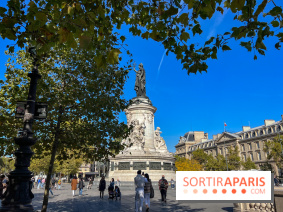This Wednesday October 14, 2020, the Council of Ministers has decided to re-implement the health emergency in mainland France over the current situation that has been degrading a lot since this summer. The health emergency returns from Saturday October 17, 2020 from midnight. More info as of the measures to curb the epidemic are expected on Wednesday October 14 after the president's televised address.
The report of the meeting explains that "considering its spread across the national territory, the Covid-19 epidemic is a health disaster jeopardizing - because of its nature and seriousness - the health of the population. It justifies the health emergency is claimed so that measures strictly shaped to the health risks and fitting the circumstaces of time and space can be made".
The situation earlier this year
Many specialists agree to say: the coronavirus epidemic is now under control in France. And yet, the crisis is not over… Then, even though the health emergency ended on July 10th, 2020, the parliament passed earlier this month – and according to our peers at LCI – “a bill in order to define a transitory suitable regime”. The guidelines of the bill say – as health minister Olivier Véran clarifies – even though the health emergency disappears, “not keeping some measures would be as if the risks of the resurgence (of the epidemic) do not exist”.
What is still banned? What changes? This past June 10th, when presenting the draft bill organizing the end of health emergency, the head of the government has been clear. Despite an overall improvement of the health situation in the country, “special vigilance will remain necessary for several months”. A four-month transitionary period following the end of health emergency will be implemented.
The Prime Minister will be able to ordered all along that period the possibility to regularize trips of people and vehicles, as well as access to transport (including mandatory facemasks). Jean Castex can also – if need be – order the temporary closure or regularize the opening of premises welcoming people (museums, concert and show venues, restaurants, cafés, bars…).
Another measure as for gatherings on the public road. Even though health emergency is over, the government is still able to ban or limit major gatherings. Still according to the draft bill presented by the Constitutional Council, the executive can also impose a virologic test to anyone travelling between mainland France and overseas territories.
Detaxation of overtime hours ends
From July 10, overtime hours completed after this date will no longer be exempted of tax up within the limit of 7,500€ of yearly pay, the €5000 cap becomes the new standard. Overtime hours will be once again submitted to social security contributions within companies. The waiting period in case of sick leave – that was suspended during the crisis – will be implemented again in the private sector and the public sector.
Stadiums and hippodromes reopen with a limited number of people
The end of health emergency also marks the possibility for stadiums and hippodromes to reopen to crowds so that visitors can enjoy the sport events taking place there, but with a maximum capacity within the premises under 5000 people. A measure said to last at least until September 2020. Good news for soccer and horse race fans who can once again enjoy their respective benches and live their passion again, given of course (this is for stadiums) the sport events are not closed to the public, like several soccer games.
Prices for facemasks and hand sanitizer no longer controlled?
Since July 10, stores can now – theoretically – fix their own prices on masks and bottles of hand sanitizer. In a decree released on July 11 in the Journal Officiel yet plans to control prices for these two first-necessity products to January 10, 2021. Good news for users who no longer have to pay more for these products.
Traffic and re-containment: the limits of this transitory bill
But these restrictions and bans have limits enacted during the vote defining this transitory regime: then, as our peers at LCI remind “can only be restricted or banned trips by plane or boat”. Trips in car and other vehicle transporting goods can not be banned or with more difficulty, excluding in the event of “reactivation of the virus”. General containment will no longer be imposed.
As for facemasks, they remain mandatory in public transport “up to four months after the end of health emergency” that is to say to November 2020. And by amendment from MPs, the Scientific Committee is kept as long as the transitory regime lasts.
As for the other measures passed as part of health emergency, they “can be kept only within the conditions and limits of common law” the Council of Ministers report read on June 10, 2020.
Last but not least, the bill also plans “to extend the length of the preservation of data collected as part of information systems set up to fight against the epidemic, excluding Stop Covid, in compliance with their finalities especially for research, and with all the necessary guarantees”.















